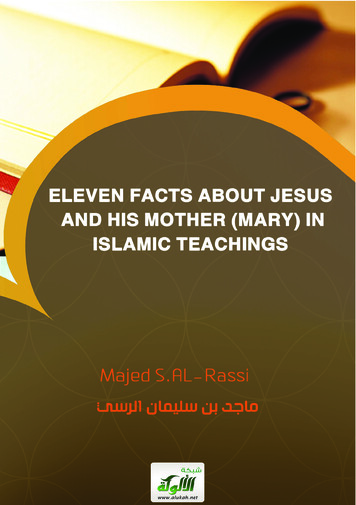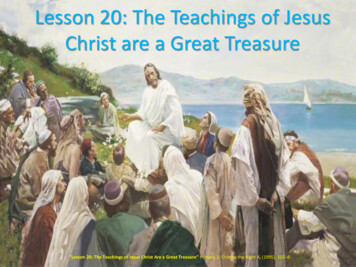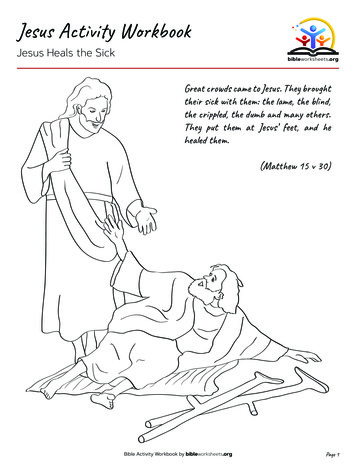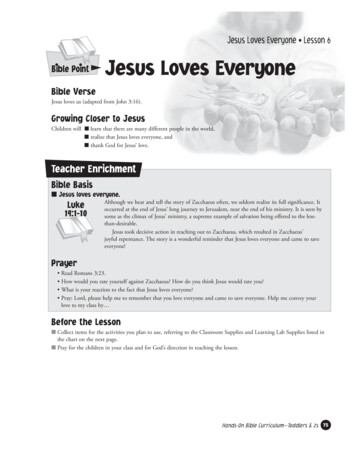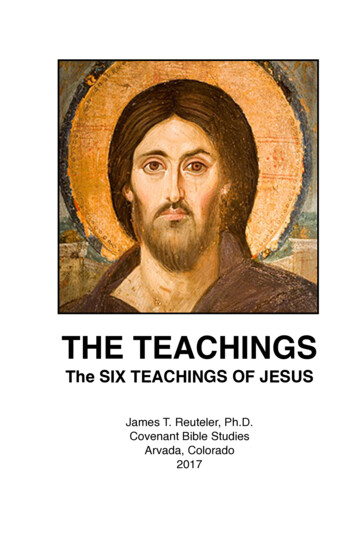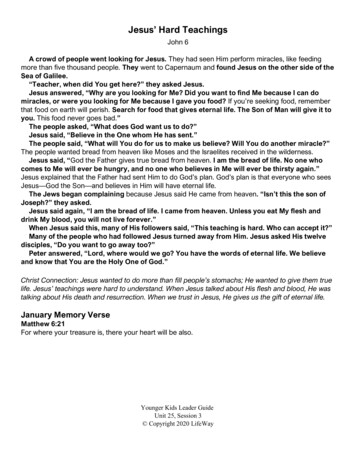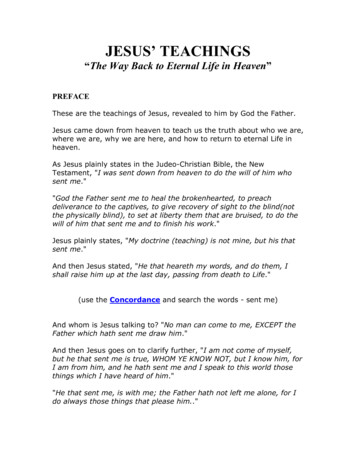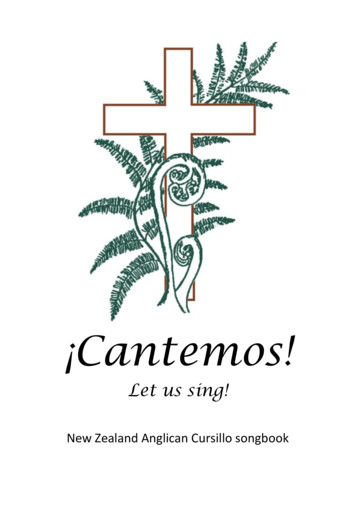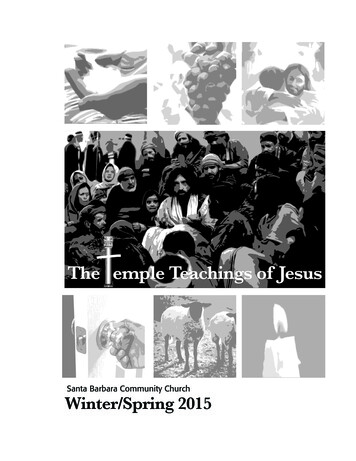
Transcription
The emple Teachings of JesusSanta Barbara Community ChurchWinter/Spring 2015
Sources & AbbreviationsThe emple Teachings of JesusBarclayWilliam Barclay, The Gospel of John (Westminister, 1956), 2 vols.BruceF. F. Bruce, The Gospel to John (Eerdmans, 1983).BurgeGary Burge, John: The NIV Application Commentary, (Zondervan, 2000).CarsonD. A. Carson, The Gospel According to John, (Inter-Varsity Press, 1986).GundryRobert H. Gundry, Commentary on the New Testament, (Hendrickson,2010).HendricksonWilliam Hendrickson, A Commentary on the Gospel of John (Banner ofTruth, 1959).MichaelsJ. R. Michaels, John (Hendrickson, 1989).MilneBruce Milne, The Message of John (Inter-Varsity Press, 1993).NewbiginLesslie Newbigin, The Light Has Come: An Exposition of the FourthGospel, (Handsel Press, 1982).TaskerR. V. G. Tasker, The Gospel According to St. John (Eerdmans, 1960).TenneyMerrill Tenney, The Gospel of John The Expositor’s Bible Commentary,vol. 9 (Zondervan, 1981).All Scripture passages are taken from the English Standard Version unless otherwise noted.This study guide was prepared by SBCC’s pastoral staff. Studies 1-7 were written by ReedJolley. Studies 10 and 14 were written by Benji Bruneel. Studies 15 and 16 were written byErik Anderson. Studies 8-9, 11-13, and 17 were written by Steve Jolley. Cover design andstudy layout by Carolee Peterson.
Contents & Calendar 1The emple Teachings of JesusStudy 1Destroy This TempleJohn 2:12-22Study 2My Father Is WorkingJohn 5:1-18Study 3The Son Can Do NothingJohn 5:19-47Study 4I Come From HimJohn 7:1-31Study 5Out Of His Heart Will Flow Living WatersJohn 7:32-39Study 6Neither Do I Condemn YouJohn 8:1-11Study 7I Am the Light of the WorldJohn 8:12-20Study 8The Truth Will Set You FreeJohn 8:21-38Study 9You Are of Your Father the DevilJohn 8:39-47Study 10Before Abraham Was, I AmJohn 93/1/15453/8/15493/15/15553/22/15633/29/15Easter 4/5/15Study 11The Light of the WorldJohn 9:1-41694/12/15Church Retreat 4/19/15Note: Homegroups will review the studies together the week before the Sunday sermon date.
2Study 12I Am the DoorJohn 10:1-21Study 13If It Dies, It Bears Much FruitJohn 12:20-26Study 15The Light Is Among YouJohn 12:34-36Study her, Glorify Your NameJohn 12:27-33Study 164/26/15My Sheep Hear My VoiceJohn 10:22-42Study 1475His Command is Eternal LifeJohn 12:44-50
Study One3Study 1Destroy This TempleJohn 2:12-22Of the annual feasts on the Jewish calendar, none was more important than Passover. Thisfeast looked back to God’s deliverance of Israel from Egypt. It was during the first Passoverthat Israel became Israel! The people moved from being enslaved toward entering thepromised land (see Exodus 12). This section of John contains the first of three or possiblyfour Passovers we read of in the Fourth Gospel (2:13; 6:4; 11:55, with 5:1 as a potentialreference to another Passover). In fact, as we will see, John presents Jesus as the PassoverLamb in the dramatic conclusion to his gospel!Chapter 2 of John’s gospel is divided evenly into two halves. The first half takes place inGalilee, northern Israel. Then, quite abruptly, in verse 13 we find Jesus in Jerusalem duringthis very somber and significant feast.Before going on in this study, read John 2:12-22. Jot down a note or two of what stands out.What kinds of questions arise in your mind as you read this passage?We are not told specifically where this happened, but most see this taking place in the hugeouter-court of the temple complex, The Court of the Gentiles. Evidently, by the time of Jesus,this court had become a loud, noisy marketplace. And a corrupt marketplace as well. WilliamHendrickson explains. the court of the Gentiles [in the temple] had been changed into what must haveresembled a stockyard. There was the stench and the filth, the bleating and thelowing of animals, destined for sacrifice. It is true, in the abstract, that each worshipperwas allowed to bring to the temple an animal of his own selection. But let him tryit! In all likelihood it would not be approved by the judges, the privileged vendorswho filled the money-chests of Annas [the high priest]! Hence, to save trouble and
4The emple Teachings of Jesusdisappointment, animals for sacrifice were bought right here in the outer court. . . Ofcourse, the dealers in cattle and sheep would be tempted to charge exorbitant pricesfor such animals. They would exploit the worshippers. . . And then there were themoney-changers, sitting cross-legged behind their little coin-covered tables. Theygave the worshipper lawful, Jewish coin in exchange for foreign currency. It mustbe borne in mind that only Jewish coins were allowed to be offered in the temple,and every worshipper. . . had to pay the annual temple tribute of half a shekel (cf.Exodus 30:13). The money-changers would charge a certain fee for every exchangetransaction. (Hendrickson, p. 122)Look carefully at 2:15. The passage says, he drove them all out of the temple, with thesheep and oxen. Imagine this for a moment. Look for an artistic rendering of the templearea either online or in your Bible. How long do you think this took for Jesus to complete?Consider the authority Jesus must have wielded in his very person. He is destroying thebusinesses of many at high season. Yet, they allow him to do so! What is your reaction tothis?Over the next weeks we will be examining Jesus’ teachings in the temple. Here, in twosentences, we find the first of many temple discourses (see vv. 16, 19). Again, before goingon in this study, re-state Jesus’ brief teaching. What does he say in these two sentences?
Study One5Matthew, Mark and Luke record a similar incident at the end of Jesus’ ministry, right beforehis crucifixion. Read their accounts of Jesus’ cleansing the temple. What similarities anddifferences do you find between John and the synoptic gospels (Matthew, Mark and Luke)? Matthew 21:12-17 Mark 11:15-19 Luke 19:45-48Why is the cleansing of the temple so significant that it is included in all four gospels?As we read John’s account of Jesus cleansing of the temple we should note several details: First, John’s gospel places the event at the beginning of our Lord’s ministry asopposed to the last week of Jesus’ ministry in Matthew, Mark and Luke. Second, in John Jesus is concerned over the fact that there are money changersin the temple and not that they are dishonest (as is the case in the other threegospels, cf. Luke 19:45-46). Third, in John Jesus drives out the animals; in the first three gospels he expels themoney changers themselves. Fourth, in John Jesus connects his action with the sign of destroying andrebuilding the temple. In Matthew, Mark and Luke this sign is brought up at Jesus’trial.
6The emple Teachings of JesusWith these differences in mind it seems that John is giving us an account of the first of twotemple cleansings, one at the beginning and the other at the end of Jesus’ ministry. In John 2we have two highly significant events. The changing of the water to wine is a hidden sign forthe disciples. The cleansing of the temple is a public sign for the Jews given in their centralplace of worship.But why did Jesus do it? Why is he concerned over the presence of those selling animals inthe temple? Aren’t they supposed to be there? Again, in John there is no suggestion that themoney changers were dishonest. Were not animals necessary for the sacrificial system whichwas firmly in place during the time of Jesus?At one level there is a messianic announcement here. The prophet Zechariah foretold of aday when the temple would be devoid of merchants or traders (Zechariah 14:21). Malachi3:1-4 reads,Behold, I send my messenger, and he will prepare the way before me. And theLord whom you seek will suddenly come to his temple; and the messenger of thecovenant in whom you delight, behold, he is coming, says the Lord of hosts. Butwho can endure the day of his coming, and who can stand when he appears? Forhe is like a refiner’s fire and like fullers’ soap. He will sit as a refiner and purifier ofsilver, and he will purify the sons of Levi and refine them like gold and silver, andthey will bring offerings in righteousness to the Lord. Then the offering of Judah andJerusalem will be pleasing to the Lord as in the days of old and as in former years.In cleansing the temple Jesus announces, “Messiah is here! The temple is cleansed!”When the Jews ask for a sign of Jesus’ authority Jesus could have said, You just had yoursign, I cleaned up the temple. Instead he predicts, in a single sentence, both his own deathand resurrection and the destruction of the temple built by Herod.1Newbigin explores the rich irony of Jesus’ words.The Temple is the place of sacrifice, where God has provided the “mercy seat” atwhich sin is put away and men and women can come into the presence of God. Butwith the death of Jesus the one true sacrifice is offered and there is no more need forthe blood of sheep and oxen. The Temple is the place of God’s tabernacling wherehis glory dwells. But in Jesus the word of God has come to tabernacle among us andwe have seen his glory (1:14). The flesh and blood of Jesus, this man, is the templewhere God dwells in the fullness of grace and truth. The Jews will destroy the Temple,1 Herod’s temple was destroyed by the Romans in 70 A.D.
Study One7but Jesus will raise it up (not build another one as in the “false witness” quoted by thesynoptics). The man’s body will be the true temple, built of living stones and alwaysgrowing into fullness (Ephesians 2:19-21). (Newbigin, p. 33)Newbigin goes on to point out the depth of meaning in Jesus’ action.So the action of Jesus is more than an example of prophetic protest against corrupt religion.It is a sign of the end of religion. (Newbigin, p. 33)John points out in verse 22 it is only after the resurrection that the disciples understand thefullness of this sign.Think of this story in its larger context as the original readers must have done if we are correctin assuming John was written late in the first century. They knew the earthly temple hadbeen destroyed by Titus in 70 A.D. John’s believing readers, we might suppose, had somefamiliarity with Paul who develops the notion of the people of God as the new temple. Readand discuss the following texts in light of John 2. 1 Corinthians 3:16-17 1 Corinthians 6:19-20 Ephesians 2:19-22 1 Peter 2:4-5What do John 2 and the above texts teach us about corporate worship?
8The emple Teachings of JesusWhat do the above verses have to say about a casual approach to corporate church worship?What would Peter and Paul say to someone who decided to skip corporate worship in orderto sit on the beach, read a good book, or participate in a favorite sporting event?When Jesus cleanses the temple he is intent on protecting the Father’s reputation; How dareyou turn my Father’s house into a market! Think through this statement with regard to theabove passages. If Jesus was concerned for the purity of temple worship, what should ourconcern be for the purity of the church?A Christian’s body is a temple of the Holy Spirit within him or her (1 Corinthians 6:19).Practically speaking, what does this entail? What could a person do using his or her body tobest house the Spirit of God? What are natural results of the Holy Spirit’s indwelling?Respond to the following statement by Bruce Milne.A significant proportion of the Bible is devoted to the regulation of worship and weare sadly misled if we imagine that the quality of what we offer in worship services, orthe devotion with which we participate, are matters of peripheral importance. If ‘Jesusis Lord’, he claims the temple as a primary sphere of his rule. Modern-day worshipwhich is irreverent, superficial, distraction-filled, cold, lifeless, sloppy, self-indulgent,
Study One9hypocritical, ill-prepared or theologically inappropriate will likewise receive his censure,as will worship which detracts from the honour and glory of the living God through aconcern for performance and self-display on the part of those leading it. (Milne, pp.70-71)Have you ever thought of SBCC as a temple of Jesus? Would he be pleased with ourcorporate worship? How do you structure your week and your Sunday to make a contributionto our worship together?
10The emple Teachings of JesusNotes
Study Two11Study 2My Father Is WorkingJohn 5:1-18One of the dramatic plotlines in John is of belief and unbelief. The Gospel was written toprompt belief (20:30-31), but along the way we find the refusal to believe on the part ofmany which morphs from reservation and hesitation about Jesus to outright and sometimesofficial opposition. (Carson, p. 240)Chapter 5 begins with the words, After this which show a break in the chronology. Jesusis again in Jerusalem and will perform his third sign.1 Here our Lord seeks out an individualwho doesn’t even know who Jesus is. The man makes no request of Jesus, demonstrates nofaith, as in Cana (4:46ff.), and may even prefer his state of sickness over health.Before going on in this study, read John 5:1-18. This is a very dramatic story which heightensthe tensions between Jesus and the religious authorities. At the end of the passage Jesusutters a zinger which outrages the Jews. Enter in to this drama. What stands out? What isconfusing to you?This story is dripping with irony which we might miss as twenty-first century readers. Someof the details we might think of as simply the trappings of good story telling are anything butthat. The incident takes place where? At a pool just outside the temple complex. Evidentlythere was a tradition that at certain times an angel would stir the waters of the pool, and thefirst one in was healed.1 Tenney, p. 61, writes, John was less interested in chronology than in following the trend of Jesus’ conflictwith unbelief.
12The emple Teachings of JesusBut John draws our attention to the architecture around the pool itself. It has five roofedcolonnades.Commentators point to the significance of the number five in this passage. The Samaritanwoman had five husbands in the previous chapter. The most revered section of the JewishBible was the Torah, the five books of Moses (Genesis, Exodus, Leviticus, Numbers andDeuteronomy).John’s calling attention to this number suggests we should prepare for a symbolicallusion to what he stated outright in 1:17: the Law was given through Moses; graceand truth came on the scene through Jesus Christ . (Gundry, p. 374)Furthermore, we learn the man has been sitting by the pool for thirty-eight years! This isthe exact number of years the Jews wandered in the wilderness (Deuteronomy 2:14). Theywandered because of their disobedience after receiving the law!So just as the Jewish water of purification at the wedding feast in Cana representedthe inadequacy of the Mosaic law, here the water of the five-porched pool representsthe inadequacy of the Mosaic law. (Gundry, p. 374)Notice the surprising question Jesus asks the invalid in verse 5, Do you want to get well? DoI want to get well? Of course I want to get well I’ve spent my life by this pool!! Butmaybe not. The man may, after thirty-eight years of paralysis, have adapted to his state andaccepted it.1 His paralysis has possibly become an integral part of his identity. In any event,the man’s answer shows resignation and despair. No one will help me into the water.2Have you ever found yourself afraid of healing? Afraid of God’s touch in your life? If youhave experienced this, or watched someone else struggle in this area, describe this to yourhomegroup if it is appropriate.1 Becoming well might also have affected his income. Milne quotes Finlay, An eastern beggar often loses agood living by being cured. (Milne, p. 95)2 Verses 3b-4 are not in the best manuscripts of the Bible. These words were probably added later to clarify.
Study Two13How would you encourage someone who is struggling with the possibility (probability) ofGod’s intervention—which would heal, but might significantly alter some area or even thedirection of his or her life?Jesus speaks and two things happen. The man is healed and the Jews are incensed. Hey.Whoa, wait just a minute. What are you doing carrying your bed on the Sabbath? That’sagainst the law! (v. 10)We are shocked to see their outrage, but Sabbath-keeping was monumental for devout Jews.This was the law that set them apart from their corrupt neighbors.The law of the sabbatical rest was perhaps the most important of all the bulwarksby which Judaism was protected from erosion by the encompassing paganism.(Newbigin, p. 64)Accordingly the Jews argued (and wrote laws) about minute areas of life. They specifiedthirty-nine categories of work which broke Sabbath keeping.[T]he Rabbis of Jesus’ day solemnly argued that a man was sinning if he carried aneedle in his robe on the Sabbath. They even argued as to whether he could wearhis artificial teeth or his wooden leg. (Barclay, p. 178)Imagine, to wear artificial teeth or a wooden leg was to carry a load and thus to work, andthus to violate Sabbath law!When questioned, the healed man immediately points the blame to Jesus. He healed me!He is the one who told me to work on the Sabbath by carrying my bed!Read verse 14. In time, Jesus finds the man in the temple. What does Jesus say?
14The emple Teachings of JesusBob Gundry explains. Respond to the following quotation:The healing represents salvation, and salvation means being saved from sin, notonly from its penalty but also from its power over your life and conduct . “Lestsomething worse happen to you”—worse than thirty-eight years of being an invalid.That sounds pretty bad. What is this worse something? Well, if the healing representssalvation, eternal life, the worse thing must be damnation, eternal death—and eternityof existence in separation from God, to live in communion with God, so that to existapart from him is absolute ruination. (Gundry, p. 374)With the above in mind we can say that Jesus has done for each of us who know him whatthe waters of the pool could not do. He has told us to pick up our bed and walk. Describewhat this has looked like in your life. Describe the spiritual and physical healing you haveexperienced because Jesus sought you out and spoke his word to you.In short order, it is not the invalid who is on the hot seat, but Jesus. The Jews werepersecuting Jesus, because he was doing these things on the Sabbath.The invalid appealed to the authority of the man who healed me . But when Jesus ischallenged (persecuted) his appeal is utterly shocking. He appeals to the authority of theFather (v.17). My Father is working until now, and I am working.1 Ugh!! Thud!!First-century Jews pondered whether or not God himself kept the Sabbath. But they knewthat whether God was a Sabbath breaker or not, he kept working on the seventh day,otherwise how would the universe function? Jesus agrees with this logic. God works on theSabbath! And so does Jesus!1 Barclay cites a Rabbinic saying, The sun shines; the rivers flow; the processes of birth and death go on,on the Sabbath as on any other day; and that is the work of God. Jews held that God ceased on theseventh day only from the “act” of creation. His higher works of judgment, mercy, compassion and love stillcontinued. (cf. Barclay, p. 179)
Study Two15What does Jesus imply with his answer? What happens? Read 5:18!Sometimes Jews would refer to God as our Father But this is different. Jesus refers toYahweh as my Father. Jesus is making himself equal with God! He is challenging thefundamental distinction between the holy, infinite God and finite, fallen human beings. Forthis reason the Jews tried all the harder to kill him. (Carson, p. 249)The drama is far from over. Jesus’ temple teaching will reach new heights in the rest of thechapter.
16The emple Teachings of JesusNotes
Study Three17Study 3The Son Can Do NothingJohn 5:19-47John 5:17 contains one of the more incriminating statements of Jesus in the temple. MyFather is working until now and I am working.Jesus’ interrogators understood exactly what our Lord meant. He was claiming equality withGod! The rest of John 5 is a sermon from Jesus to his adversaries. This is one of the greattemple teachings of Jesus in John’s gospel.Before going on in this study read John 5:19-47. Examine the passage carefully. It will bechallenging. Make a list of all the things Jesus says about himself in these verses. Make asecond list of questions that arise in your reading.After reading this passage, and making our notes, we are likely to say, Wow. What isthis about?!!! Indeed, some of this passage is dense and, at first glance, inaccessible.Commentator Bruce Milne is helpful. He points out that in the first section, verses 19-30,Jesus focuses on his unique relation to the Father. Jesus claims equality with God, not as arival god, in competition with Yahweh, but rather, it is an equality expressed as a unity in which the Son is so utterly submitted tothe Father that the two are one in the works that they do; the son can do nothing byhimself (v. 19). Jesus places no limit on his dependence on the Father.
18The emple Teachings of JesusMilne goes on to quote C. K. Barrett,The Father is God sending and commanding, the Son is God sent and obedient.(Milne, p. 98)With the above in mind, we find Jesus making two astounding claims in this passage.1. The Son will raise the dead at the end of the age (vv. 21, 25, 28ff.).2. The Son will be the judge of all people at the end of the age (vv. 22, 27, 29-30).Both of these are the prerogatives of deity, demonstrating his sovereignty. The passagedoesn’t tell us, but what do you think the response was from those who wanted to questionJesus about a Sabbath healing?What does God want us to see in this teaching? What do you learn about God from verses19-29? Consider, especially, v. 21. What does this tell you about your salvation?Now look over 5:19-30 again. This time consider what they tell you about the Father’srelation to the Son and the Son’s submission and dependence upon the Father? Notice andponder the inner working of the divine Trinity.
Study Three19As you work through this passage, consider Tenney’s comment on verse 19. How does thishelp clarify?The Son is dependent on the Father. He does not act independently apart from theFather’s will and purpose. Throughout this Gospel Jesus continually asserted that hiswork was to do the will of the Father (4:34; 5:30; 8:28; 12:50; 15:10). Equality ofnature, identity of objective, and subordination of will are interrelated in Christ. Johnpresents him as the Son, not as the slave of God, yet as the perfect agent of thedivine purpose and the complete revelation of the divine nature. (Tenney, p. 64)List the following:The Father’s Relation to the SonThe Son’s Relation to the FatherWhen we call the first person of the Trinity the Father and when we call Jesus the Son weare employing figures of speech which help us understand their essential nature and theirrelationship to one another. Muslims are correct when they say that the Father did not havea baby and name the child Son. No. Here we are looking at two members of the eternalTriune God, the one God who is three persons, Father—Son—Holy Spirit.Some Christians of our time are having a difficult time with the image of God as Father. Whyis this?
20The emple Teachings of JesusWhat is the proper response to such a difficulty? Should we drop language which refers toGod as Father?Consider the following by Douglas Wilson:[God’s] masculinity is not a function of Him being male. God the Father is not male,but He is still ultimately masculine.1Wilson goes on to quote C. S. Lewis,“Since God is in fact not a biological being and has no sex, what can it matter whetherwe say He or She, Father or Mother, Son or Daughter?” But Christians think that GodHimself has taught us how to speak of Him.2Then Wilson explains,When we call him Father, we are not saying (or implying) that He is male in anyway So we do not call God Father because we have projected our notions of male-basedfatherhood up into the heavens. We call Him Father because traces of His masculinityhave been bestowed on us. A father down here partakes of the Fatherhood in somemysterious way. The apostle Paul tells us in Ephesians that “all fatherhood derives itsname” from God the Father (Ephesians 3:14-16).3In John 5, Jesus repeatedly refers to his Father. What does this mean to you? What does itmean to you to call God Father? How could this give you great comfort?1, 2, 3 Douglas Wilson, Father Hunger (Thomas Nelson, 2012), p. 38.
Study Three21It is easy to grow accustomed to the gospels and the teaching of Jesus. Verses 24-30 areshocking! Here a Palestinian Jew claims he will judge the masses of humanity. Consider thewords of C. S. Lewis.In the mouth of any speaker who is not God, these words would imply what I canonly regard as a silliness and conceit unrivaled by any character in history. . . You mustmake your choice. Either this man was, and is, the Son of God; or else a madman orsomething worse. You can shut him up for a fool, you can spit at him and kill him asa demon; or you can fall at his feet and call him Lord and God. (Mere Christianity, pp.55-56)This passage presents the unity of the Father and the Son within the Trinity. As believers welive with this mystery—one God as Father, Son and Holy Spirit. Jot down a few notes andthink through this as a homegroup. Encourage one another to marvel at our great God!In verses 31-40 Jesus continues his teaching to his detractors. He mentions three witnessesto himself. Who (or what) are they?1. The witness of John the Baptist (5:33-35).2. The witness of Jesus’ miracles (5:36).3. The witness of the Father’s voice in the Scriptures (5:37-46).
22The emple Teachings of JesusAgain, these verses are a mine deep enough that we could never plumb its depth.Nevertheless, re-read these verses. Describe each witness to Jesus. What is their significance?How do these witnesses add to your knowledge of Jesus and bolster your confidence that heis your Lord?Read verses 39-47. Jesus is far from a passive defender in these verses. What accusationsdoes he make about his opponents?What does Jesus mean when he says, Your accuser is Moses? (v. 45)Jewish religion tended to focus on the outward, what is seen and done, to the neglect of theinward. The New Testament looks inwardly, at belief, faith and then what comes out of theheart.What are the witnesses which exist for Christians? Compare your lists as a homegroup. Whataccusations might Jesus make about the church, SBCC, or you?
Study Three23Practically speaking, what must a believer do to be faithful to the witnesses God hasprovided? If there is one particular thing that stands out to you personally, share this with yourhomegroup. Encourage one another towards deeper discipleship.As a group, revisit this question in a few weeks!
24The emple Teachings of JesusNotes
Study Four25Study 4I Come From HimJohn 7:1-31When we open this chapter, Jesus is up north in Galilee. John 7:1 indicates Jesus is goingto stay away from southern Israel because it is too dangerous. The irony of the narrative isthat almost immediately Jesus goes south! He goes to Jerusalem and, as far as John tells thestory, we don’t find Jesus back in Galilee until he has been crucified and has risen from thedead (21:1ff). The darkness is closing in around the light of the world.From now on we find frequent references to the Jews’ attempt to kill Jesus (cf. 7:13, 19, 25,30, 32, 44; 8:37, 59). John’s Gospel is less interested in where Jesus traveled and lived mostof his life than in his visits to Jerusalem. (Michaels, p. 124) Jerusalem is the storm-centreof the Messiah’s ministry, where He vindicates His claims before consummating His workoutside its walls. (Tasker, p. 101)Keep the following outline in mind during the next few weeks of our study:I. The Journey to Jerusalem (7:1-13)II. Feast of Tabernacles: Sermon One (7:14-39)Postscript: (7:40-52)III. Interlude: The Woman Caught in Adultery (7:53 — 8:11)IV. Feast of Tabernacles: Sermon Two (8:12-59)Postscript: (9:1-41)V. Feast of Tabernacles: Sermon Three (10:1-21)Chapter 7 begins with Jesus’ brothers taunting him. If you would be king, go to Jerusalem.It is there you can make a name for yourself. Jesus refuses their temptation, It’s not theright time (v. 6). Jesus, throughout John’s gospel, is in control of his destiny. His hour willcome not according to the whims of his opponents, but according to the will of God (12:23,28; 17:1, etc.).
26The emple Teachings of JesusNevertheless, after his brothers go to the feast, Jesus follows in private.The feast in these chapters is the Feast of Tabernacles (or Feast of Booths) held in lateSeptember or early October.1 This feast, one of the three most important annual feasts,began five days after the Day of Atonement (Yom Kippur).2 Historians agree this was themost popular of the feasts. It was basically a week-long party which celebrated, non-stop,the miraculous provision Yahweh had made for his people as they wandered through thedesert after the exodus.3 Each family would, literally, build a small house (booth) outside ofJerusalem and live in it for the week. These humble dwellings were to remind the peoplethat they were once a nomadic people who had now been granted the land of Israel as apermanent home. Joy and thanksgiving, therefore, marked this feast from beginning to end.Originally, the feast lasted seven days, but an eighth day was added so that the participantscould rest after all the festivities of the previous week.4With the above in mind read John 7:1-31. Make a few notes and jot down any question yourinitial reading of this passage brings to mind.Now look over these verses again. Why is Jesus so controversial? What is it about h
with the death of Jesus the one true sacrifice is offered and there is no more need for the blood of sheep and oxen. The Temple is the place of God's tabernacling where his glory dwells. But in Jesus the word of God has come to tabernacle among us and we have seen his glory (1:14). The flesh and blood of Jesus, this man, is the temple


